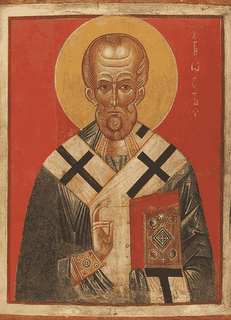SAINT Nicholas. Day of death: (according to the martyrology) December 6, about 360. Grave: originally at Myra; since 1087 at Sari in Italy. Life (highly legendary): Nicholas was born at Patara in Asia Minor to parents who, having long been childless, had petitioned God with many prayers. Already as a youth Nicholas became noted for his zeal in helping the unfortunate and oppressed. In his native city there lived a poor nobleman who had three marriageable daughters; he could not obtain a suitor for them because he could offer no dowry. The contemptible idea struck him to sacrifice the innocence of his daughters to gain the needed money. When Nicholas became aware of this, he went by night and threw a bag containing as much gold as was needed for a dowry through the window. This he repeated the second and third nights. During a sea voyage he calmed the storm by his prayer; he is therefore venerated as patron of sailors. On a certain occasion he was imprisoned for the faith. In a wonderful way he later became bishop of Myra; his presence is noted at the Council of Nicaea. He died a quiet death in his episcopal city, uttering the words: "Into your hands I commend my spirit."
--Pius ParschNicholas is highly venerated in the East as a miracle worker, as "preacher of the word of God, spokesman of the Father."
If everyone took only what they needed and gave the rest to those in need, there would be no such thing as rich and poor. After all, didn't you come into life naked, and won't you return naked to the earth?
"The bread in your cupboard belongs to the hungry person; the coat hanging unused in your closet belongs to the person who needs it; the shoes rotting in your closet belong to the person with no shoes; the money which you put in the bank belongs to the poor. You do wrong to everyone you could help, but fail to help."
--Basil, 4th Century
"The large rooms of which you are so proud are in fact your shame. They are big enough to hold crowds--and also big enough to shut out the voices of the poor....There is your sister or brother, naked, crying! And you stand confused over the choice of an attractive floor covering."
--Ambrose, 4th Century
If you go back to John the Baptist, you get the same message Ambrose and Basil are offering here. But not back to Matthew's story; this time, go to Luke's;
So [John] would say to the crowds that came to be baptized by him, "You spawn of Satan! Who warned you to flee from the impending doom? Well then, start producing fruits suitable for a change of heart, and don't even start saying to yourselves, 'We have Abraham as our father.' Let me tell you, God can raise up children for Abraham right out of these rocks. Even now the axe is almost at the roote of the trees. Every tree not producing choice fruit gets cut down and tossed into the fire."The crowds would ask him, "So what should we do?"And he would answer them, "Whoever has two shirts should share with someone who has non; whoever has food should do the same."
--Luke 3:7-11 (SV)
A little extension of Matthew's version there, but salient in light of what Jesus said about Elijah, which his disciples understood to mean John the Baptist. Elijah is an interesting choice, because Elijah was (is) such an important prophet it was expected he would return before the Lord comes, before, as Malachi puts it, that "great and terrible day." Jesus compares John to Elijah. It's hard, in other words, to be a greater prophet than Elijah; but John is the Elijah who has come as herald. We focus on the "herald" part of that; we should focus on the "great prophet" part of that. As Malachi puts it, Elijah is above Moses, above all the prophets we think "great" because we remember them in Advent, or take their words out of context to predict the end of the world. We should pay more attention to Elijah.
We should pay more attention to John. To give your extra shirt to a shirtless man; to share your food because you have this day your daily bread, is not a suggestion. As Ambrose says, as Basil says, the commandment is clear. And the commandment comes from John: standing by that river, wearing animal hides and shouting at people who come to listen despite his anger. I know lots of preachers who love to spew fire and brimstone and imagine they are John, painting the horrors of sinners in the hands of an angry God. But John is more radical than that, goes further than they would. He offers salvation, and it isn't in confession or belief or even claiming repentance. It is in producing fruits suitable for a change of heart. It is in giving away what you have an excess of; and "excess" means more than you need for today.
The commandment is clear. The voice is that of Elijah. The voice is that of God. Baptism is the least of it. John is more than a herald.
Advent can be a real kick in the head.

No comments:
Post a Comment